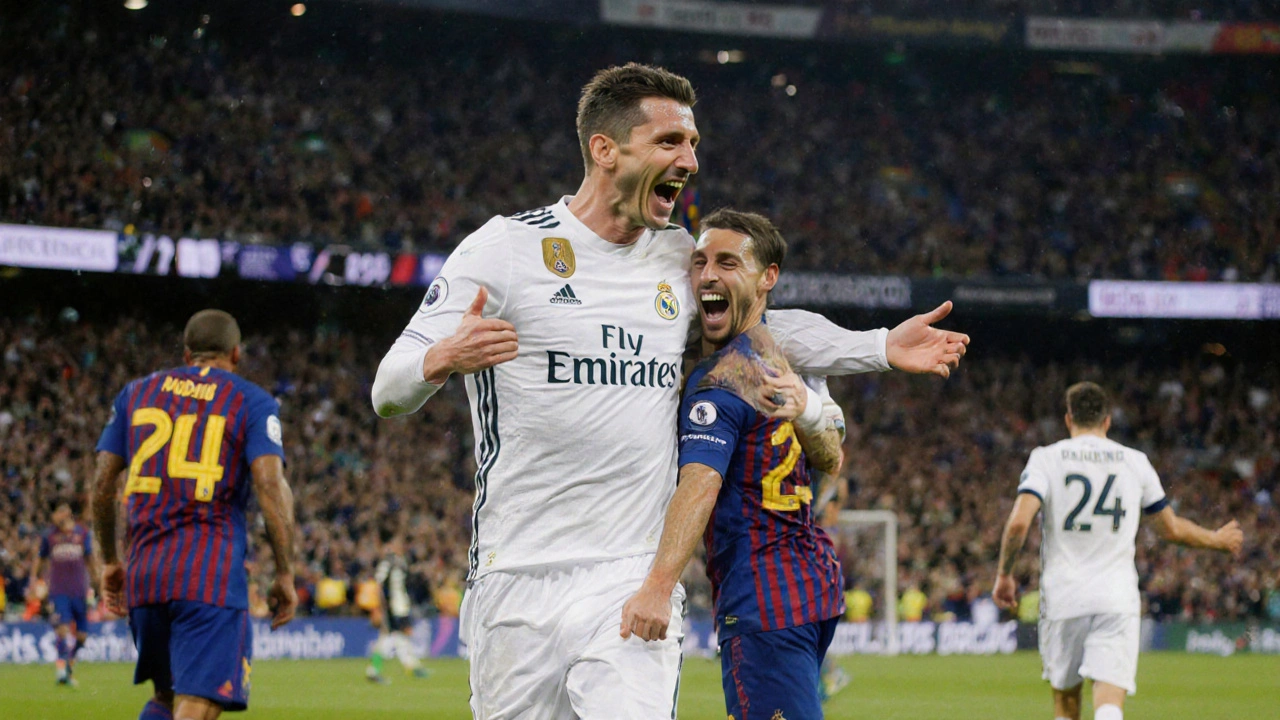Match overview: how Osasuna turned a tight game into a clean win
When the referee blew the whistle at Estadio El Sadar on a chilly April evening, most fans expected a close‑fought contest. Both sides lined up with disciplined shapes, and the opening minutes reflected that cautious approach. Yet just before the break, Osasuna took the initiative. Barja found a sliver of space on the right, slipped the ball under the Elche back line, and tucked it home in the 38th minute. The roar from the home crowd was deafening, and the goal forced the visitors to chase the game with little time left on the clock.
After the interval, the tempo didn’t drop. Osasuna kept pressing, forcing Elche into errors. The pivotal moment arrived in the 68th minute when Gonzalez, trying to clear a dangerous cross, inadvertently redirected the ball into his own net. That own goal effectively sealed the match, allowing the Pamplona side to relax and manage the game wisely. By the final whistle, the scoreboard read 2‑0, a result that felt comfortable even if the stats suggested a tighter battle.

Key stats and takeaways: why the numbers mattered
On paper, Elche looked the more dominant team. They owned 52% of possession, edged out Osasuna’s passing accuracy with 81% versus 77%, and earned five corners compared to four. Their throw‑in count also topped the home side (20 to 17), hinting at more time spent in the attacking third. However, raw possession rarely translates into points if a team can’t finish.
Osasuna’s efficiency was the story’s real headline. Out of nine attempts, three were on target and both found the back of the net—one on the scoresheet, the other an own goal that still counted for them. Elche, despite eight attempts, managed only two shots on target, none of which threatened the keeper. The defensive work was also telling: Osasuna cleared the ball 19 times, compared to 15 for the visitors, and won 24 aerial duels against Elche’s 13. Those figures illustrate a side that was compact, aggressive, and unafraid to win every ball in front of its goal.
Discipline, or the lack of it, added a subtle layer to the encounter. Referee Jorge Figueroa handed out yellow cards in quick succession—Vidal at the 45‑minute mark, followed by Sanchez just three minutes later. The bookings spiked tension, but they didn’t change the flow. Both players stayed on the field, and Osasuna’s structure held firm.
For the home team, the win reinforced a pattern that’s been emerging all season: a fortress at El Sadar. The points lifted them a notch higher in the La Liga table and kept their momentum alive as the campaign entered its final stretch. For Elche, the frustration will linger. Their technical play was solid, but the inability to convert possession into clear chances meant they left the stadium with nothing to show for their effort.
Fans in the stands—though the exact attendance was unclear due to pandemic restrictions—could feel the lift in the atmosphere after the second goal. The chants grew louder, the chants of support more confident, and the sense that the home side had once again proven why they’re hard to beat at their own ground.
Looking ahead, Osasuna will aim to replicate this balance of defensive solidity and clinical finishing on the road, while Elche must find a way to bridge the gap between controlling the ball and scoring. In a league where every point counts, the fine margins seen on this night could shape the rest of the season for both clubs.

Amol Rane
September 26, 2025 AT 03:56One could argue that the Osasuna victory transcends mere numbers, embracing the very notion of purposeful restraint.
When Barja slipped the ball through the right flank, he symbolised a fleeting opportunity that the cosmos rewards.
The timing before halftime illustrated how patience can be weaponised against possession‑laden rivals.
Gonzalez’s own goal, while accidental, manifested the inevitable consequence of a side that refuses to yield.
In this duel, efficiency eclipsed dominance, a principle applicable far beyond football.
The defensive statistics reveal a disciplined architecture that mirrors an ancient citadel.
Thus, the 2‑0 scoreline is less a result and more a testament to strategic minimalism.
Venkatesh nayak
September 26, 2025 AT 08:06The match report provides a concise synthesis of Osasuna’s tactical execution, delineating the statistical juxtaposition with commendable clarity.
It is evident that possession alone does not constitute competitive advantage, a premise reaffirmed by the final outcome.
Moreover, the defensive metrics underscore a disciplined structure, while the offensive efficiency reflects a well‑orchestrated application of chance.
Such an analysis would benefit from incorporating contextual variables, such as weather conditions and player fatigue, to enrich the narrative.
Nevertheless, the account succeeds in portraying the essential dynamics of the encounter.
Future fixtures may reveal whether this methodology constitutes a sustainable model for Osasuna’s campaign.
Overall, the piece is both informative and well‑structured 🙂
rao saddam
September 26, 2025 AT 12:16Yo, Osasuna absolutely owned the game!!! They turned that half‑hour before break into a statement!!! Barja’s slick move was pure gold!!! And then that own goal? Pure karma hitting the Elche back line!!! The stats? They don’t lie-19 clearances versus 15, 24 aerial wins, that’s domination!!! This is the kind of performance that makes you jump out of your seat!!! Keep that fire going!!!
Prince Fajardo
September 26, 2025 AT 16:26Wow, what a groundbreaking revelation-Osasuna “owned” the match because they scored twice. 🙄 As if anyone needed a reminder that goals win games. The drama of “turning a half‑hour into a statement” is practically Shakespearean. Maybe next time they’ll write a sonnet about their own goal. Absolutely riveting analysis.
Subhashree Das
September 26, 2025 AT 20:36The team's performance was a blatant exhibition of shallow tactics, masked by a veneer of statistical bravado.
Osasuna’s reliance on a solitary moment of brilliance rather than sustained pressure reveals a lack of depth.
Elche, despite statistical superiority, proved incapable of converting possession into meaningful threats, underscoring their inefficacy.
This match merely underscores the rot in modern football analysis-more numbers, less insight.
Fans are left to swallow another hollow victory, forever craving genuine substance.
jitendra vishwakarma
September 27, 2025 AT 00:46i think u r overreacting kinda a lot. osasuna did what they needed 2 win, stats are just numbers not the whole story lol. elche r still good but they just missed some chances. no need 2 be so harsh.
Ira Indeikina
September 27, 2025 AT 04:56The essence of competition lies in the conversion of potential into reality, and Osasuna epitomized this principle tonight.
Their solitary strike before the interval was not merely a goal but a manifestation of measured ambition.
When Barja navigated the narrow corridor on the right, he demonstrated that space, however scarce, can be manufactured through intellect.
The subsequent own goal, while fortuitous, was the inevitable outcome of a team that pressed relentlessly.
Statistical dominance in possession, as displayed by Elche, cannot substitute for tactical acuity.
Osasuna’s defensive metrics, with nineteen clearances and twenty‑four aerial victories, illustrate a disciplined fortitude that transcends raw ball control.
The psychological pressure applied after the first goal forced Elche into a reactive mode, diminishing their earlier composure.
This shift underscores a fundamental truth: momentum is a fickle ally that favors the prepared.
The blue‑shirted side’s ability to manage the game intelligently after taking the lead reflects a maturity often absent in the league.
Moreover, the restraint shown in not over‑committing forward preserved their structural integrity.
The match serves as a case study in how efficiency can outweigh excess.
For the supporters in the stands, the crescendo after the second goal was a palpable affirmation of collective belief.
In future encounters, Osasuna must replicate this balance of defensive solidity and opportunistic offense.
Conversely, Elche must reconcile their statistical superiority with a more incisive attacking approach to avoid similar disappointments.
Ultimately, the night’s narrative reaffirms that football is as much about philosophy as it is about footwork.
Shashikiran R
September 27, 2025 AT 09:06Well i guess its time 2 tell these guys that winning by cheating the system with stats isnt real sport. Morality says u cant just ride on luck of own goal, you need real skill. If they keep relying on opportunitiy they ll lose thier soul as a club. i read this and i think its my duty to point out the right way.
SURAJ ASHISH
September 27, 2025 AT 13:16Osasuna proved they're a force.
PARVINDER DHILLON
September 27, 2025 AT 17:26Totally agree! 🎉 It's great to see a team turn efficiency into wins, and the fans deserve all the celebration. 👍
Nilanjan Banerjee
September 27, 2025 AT 21:36In the grand theater of La Liga, tonight Osasuna performed a masterstroke, a symphony of disciplined resolve that resonated beyond the bounds of mere sport.
Their 2‑0 triumph, orchestrated with surgical precision, stands as a testament to the timeless axiom that quality eclipses quantity.
Each clearance, each aerial duel, was a brushstroke on a canvas of tactical brilliance, painting a portrait of a side unyielding in its pursuit of glory.
Such a display invites reflection upon the very nature of competition, urging us to consider that true dominance is forged not by possession, but by purposeful action.